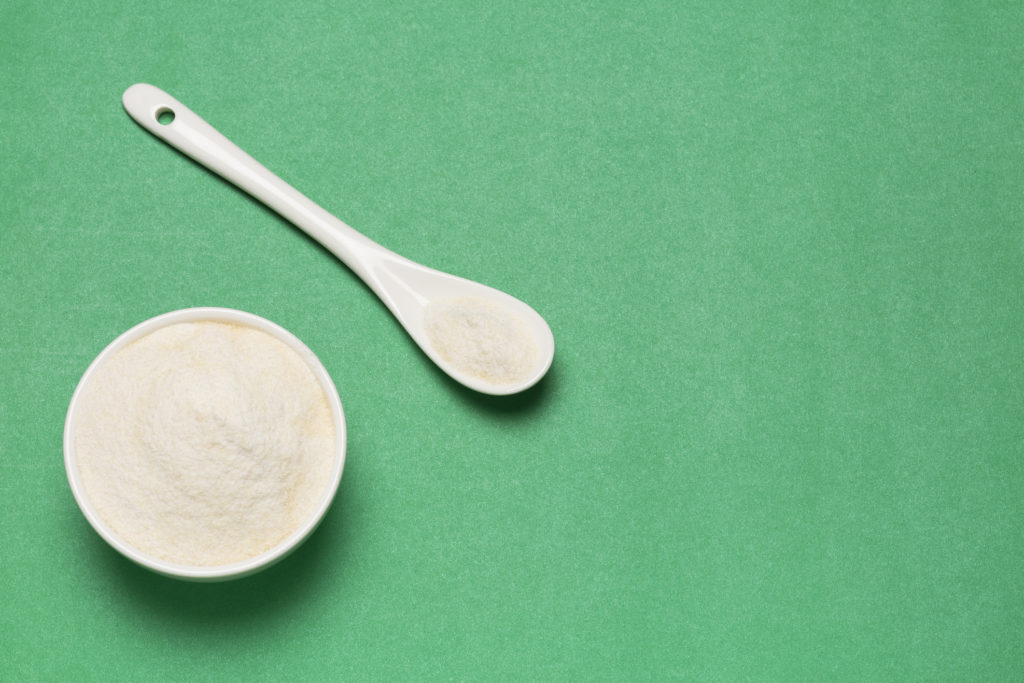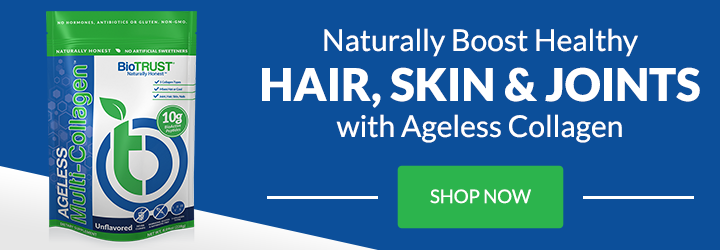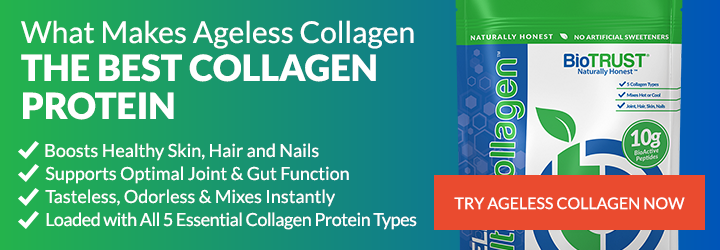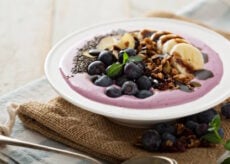How Does Collagen Work in the Body?

Believe it or not, collagen hasn’t always been as popular as it is today. In fact, it has long been regarded—if not completely discarded—as the red-headed stepchild of protein sources by many in the health and fitness world. Oh, how the tides have turned! What’s even more interesting is that collagen’s biggest “weakness” may actually be its greatest strength. In this article, we’ll reveal the fascinating ways collagen works in the body to unleash all its powerful benefits.
The History of Collagen Protein Powder
These days, people are routinely adding collagen to coffee, tea, and recipes. And they’re lathering their bodies with skincare products fortified with this “fountain of youth” protein. But believe it or not, collagen hasn’t always been the darling supplement it is today. Quite the contrary. Not long ago, instead of fervently seeking it out, people used to go out of their way to avoid collagen.
Supplement companies were accused of “sneaking” this so-called “cheap” source of protein into powders, bars, and other nutrition products. Subsequently, vigilant whistle blowers would point fingers, accusing manufacturers of cutting corners by adding this “low-quality” protein to “falsely” plump up the protein content.
Health gurus claimed collagen was a “junk protein.” They began spreading “nightmare stories” that supplement companies were stuffing their products with cut-rate protein from purified “horse hooves” and “pig ears” all while padding their pockets.
(While those nightmare stories aren’t really true, collagen protein does come from boiling the bones and hides of animals like cows and pigs—the very same animal parts that are typically discarded. Of course, our hunter-gatherer ancestors, who ate “nose to tail” and cherished these very collagen-rich cuts, knew much, much better.)
Maybe you’ve heard of collagen by a different name…gelatin, which you’ll find in powdered, fruit-flavored snack mixes (e.g., JELL-O®) on supermarket shelves.
Not exactly what you’d consider a premium source of protein, eh?
Fortunately for you and me, collagen is completely undeserving of such a reputation. In fact, the reality is quite the opposite, as collagen really is worth all the hype.
However, there is a sliver of truth to all this…
You see, collagen protein has traditionally been labeled a “low-quality” protein, at least according to the most commonly referenced scales of protein quality. These scales are based largely on a given protein source’s balance of amino acids and its content of essential amino acids (EAA), which are those the body can’t make on its own.
Because collagen protein doesn’t contain the EAA tryptophan, it has historically taken a big hit on the traditional scales of protein quality. And that myopic view led to it being met with chagrin for so long. More recently, however, the criteria for protein quality has expanded, and collagen protein ranks considerably higher than previously expected.
But you know what? This near-sightedness on arbitrary measures of protein quality doesn’t take into consideration all that collagen protein can do for the body, especially when it’s part of a healthy diet—not the only protein source.
As you’ll see, its supposed biggest weakness (amino acid profile) is actually its greatest strength.
So, How Does Collagen Work in the Body?
Maybe you’ve heard the phrase “structure determines function,” often used in biology to describe how something is arranged enables it to do its job. This couldn’t be more true when it comes to collagen protein.
You see, the structure of collagen protein is way different than any other source of protein you’re already eating—whether it comes from animals or plants. This is because it features a very unique profile of amino acids, the building blocks of the proteins we eat and the proteins that make us us.
(So, if you’ve ever caught yourself thinking, “What makes collagen so special? I already get plenty of protein from beef, chicken, fish, dairy, and eggs, and I even use whey protein.” This part is for YOU too because that’s not enough!)
1. Collagen is Rich in Rare Amino Acids
In particular, collagen protein is rich in three very specific (and rare) amino acids: glycine, proline, and hydroxyproline. In fact, collagen protein is the ONLY source of hydroxyproline.
Together, these three amino acids account for 40 – 50% of the protein in collagen—that’s 10 – 20 times higher than other typical protein sources.
Why does that matter? Glad you asked.
These are the very same raw-material building blocks our bodies need to make our own collagen-containing connective tissues, such as our skin, cartilage, bones, intestinal lining, tendons, and more.
In simple terms, “like builds like.” When you consume collagen from the connective tissues of animals, you ramp up your body’s own production of this all-important building block, which is quite literally “the cement that holds it all together.”
That’s the first way collagen works in the body, but you want to know something even more amazing about collagen? Check this out…
2. Collagen Protein Helps Where You Need It Most
While research has shown collagen supplementation increases levels throughout the body, what’s astounding is that ingested collagen seems to be especially attracted to damaged collagen in your body, which has a different chemical charge than healthy collagen.
In other words, the collagen you eat is magnetically attracted to the areas in your body where you need it most. That’s right. When you consume collagen, it basically knows where to go.
In a groundbreaking, first-of-its-kind study, researchers from Japan fed mice with osteoporosis a collagen supplement that was “labeled” (basically, it glowed in the dark) so they could “trace” the fate of its components (the amino acids and peptides). After just a few hours, the researchers confirmed that the building blocks of collagen absorbed, and they accumulated in various collagen-containing tissues throughout the body.
BUT…what was especially intriguing was the collagen raw materials didn’t just end up in random places. They concentrated where the animals needed it most: in their bones. Even more, the researchers found that one single feeding of collagen resulted in increased levels of these key building blocks in the body for 14 DAYS.1
Basically, collagen has homing sensors telling it where to send its building blocks for repair. Pretty amazing, right?
No wonder this was Kobe Bryant’s “secret sauce,” which he would have hotel chefs make upon his arrival, in his playing days, according to team doctor Cate Shanahan.
But that’s only part of the story. Believe it or not, there’s a third way collagen works in the body. Exciting, right?
3. Collagen Protein Stimulates the Production of New Collagen
Another way collagen works is by stimulating the body’s own production of new collagen. That’s right, collagen protein doesn’t just provide the body with the raw materials it needs, it also communicates with your DNA, acting as a messenger to your cells to trigger the assembly and reorganization of new collagen fibers.2
Wait, there’s more…consuming collagen also stimulates the production of elastin and hyaluronic acid.
Along with collagen, elastin is the other “youth protein” found in skin. And as you might have guessed, it’s important for maintaining suppleness and elasticity of skin. Meanwhile, hyaluronic acid is a lubricating fluid that’s mission-critical for healthy, hydrated skin and strong, supple joints.
Pretty amazing, isn’t it?
An Unsuspecting Nutritional Superhero
What’s even more amazing is how so many people dismissed collagen as a cheap, inferior, and essentially useless protein source just a decade or so ago. And I’ll admit I was one of those very whistle blowers back in the day when I “knew everything.” (You know what they say…the more you learn, the less you know. That’s the ol’ wisdom paradox in full effect.)
Thankfully, the tides have turned, and science continues to unravel the many fascinating ways collagen works in the body to unleash its powerful health benefits, which include glowing skin, a more youthful appearance, stronger nails, more comfortable joints, strong tendons, healthier bones, better physical performance and recovery, and more. What may be most astonishing is that the rationale that led many people to dismiss collagen may be the very reason why it’s so darn essential for optimal health and wellness.
If you’ve neglected collagen protein and chalked it up to hype, maybe now’s the time to give it a try. If you’ve added collagen protein to your supplement arsenal, what have you noticed? I’d love to hear your feedback. Please leave your comments and questions below!






